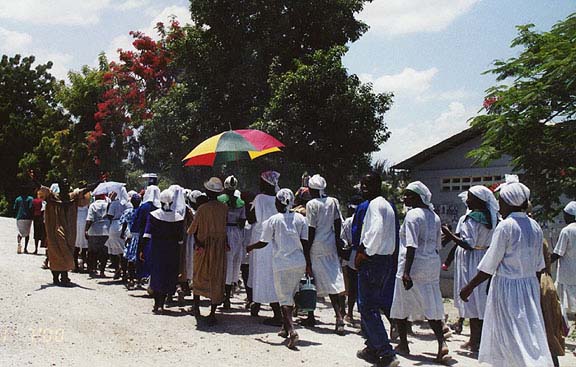
Nicole Littleton worked in Peace Corps during country's unrest
Living in Haiti
Salinas graduate worked in Peace Corps during country's unrest
By DAVE NORDSTRAND
The Salinas Californian
The chaos crippling Haiti has left its mark on Nicole Littleton, 19, too. The North Salinas High School graduate has been working there as a Peace Corps volunteer.
"I'm very worried about the people I knew," Littleton said. "I don't know if they're OK or what's going on in the area where we were.
"It's very stressful."
Last week, under protection of armed U.S. agents and an armored car, Littleton and other Peace Corps volunteers crossed the border into the Dominican Republic and to safety.
They left behind a desperate people convulsed by political violence, their economy rotting under the tropical sun.
"If you go into the city, you see 8-foot piles of garbage," Littleton said. "There's garbage in the ocean.
"People go to the bathroom wherever. They bathe in rivers where cattle go to the bathroom."
Many Haitians live in houses with mud floors. They live under cardboard and pieces of tin. With 8 million souls sharing a parcel the size of Maryland, there's scant room to move.
After high school, Littleton decided to join the Peace Corps.
She wanted to do something different, to make a difference. She wanted "a growth experience," she said.
In late June, she got her assignment.
The route to her hotel in Port-au-Prince took her through City Soleil, the "City of Sun." It's the ironic name attached to one of creation's most miserable slums.
"Crumbling houses, people bathing in filthy canals, a searing heat so you felt you were in a broiler," she recalled.
"My first reaction was, 'Oh my God! What have I gotten myself into?' "
In Salinas, Littleton had worked on a two-year organic vegetable project. That experience prompted the Peace Corps to assign her to Haiti as an "agricultural/environmental" worker.
Training in-country lasted three months. It was intensive, and she learned to speak Haitian Creole.
She learned composting and how to build rock walls and to use tree lines to prevent erosion. She learned to grow a tree nursery. She studied local health issues, Haiti's AIDS epidemic among them.
"The language is hard, and you have less than three months to get it down," she said.
"There's so much to absorb that you feel like you're going to split in two."
Her assignment was along the "arm" of Haiti that juts into the Caribbean Sea. She lived in a house. Writing all her own lesson plans, she taught English to young Haitians.
She worked on a nutrition program for pregnant women. Plans called for a nursery of the doliv tree, a native species. The tree is loaded with nutrients.
"You grind the leaves and eat them as food," Littleton said. "We'd give the trees away and give seminars to the women on how their baby develops and the need for good nutrition."
As she worked, she studied her host country.
"How long is Haiti going to be able to support human life?" she wondered. "That's the question."
Every time it rains, and it rains often, the water washes into the sea tons of soil and the nutrients it contains, she said. The soil settles, coating and smothering the coral reefs where fish breed.
Yet the people are good and heroic in their struggle.
"They have nothing but poverty every day," Littleton said. "They don't have a chance to develop and change.
"They just carry on. It's so humbling."
As Littleton worked, word of political unrest in other communities began to reach her.
In the city of Miragoane, 35 miles away, crowds burned homes and libraries. That was the second week of January.
Though she was not anticipating leaving the country, she did go to Port-au-Prince to do research on a project. She was supposed to return to her station Feb. 10 but injured her knee.
As things began to escalate, the Peace Corps assembled its workers, and the exodus to the Dominican Republic was arranged.
"I wasn't able to say goodbye to anybody," she said. "I left with one bag."
She is today in Washington, D.C., recovering from surgery on her knee. She expects to be back in Salinas soon. Then it will take a month of therapy for her knee.
College may be next. For her, the Peace Corps and her time in Haiti proved, indeed, to be a growing experience, she said.
"In the Peace Corps, you have to be an adult and be prepared to take care of yourself," she said. "There's no mom or dad to help.
"You need motivation. You're there to share your skills and time and to help people."
Originally published Saturday, March 6, 2004
